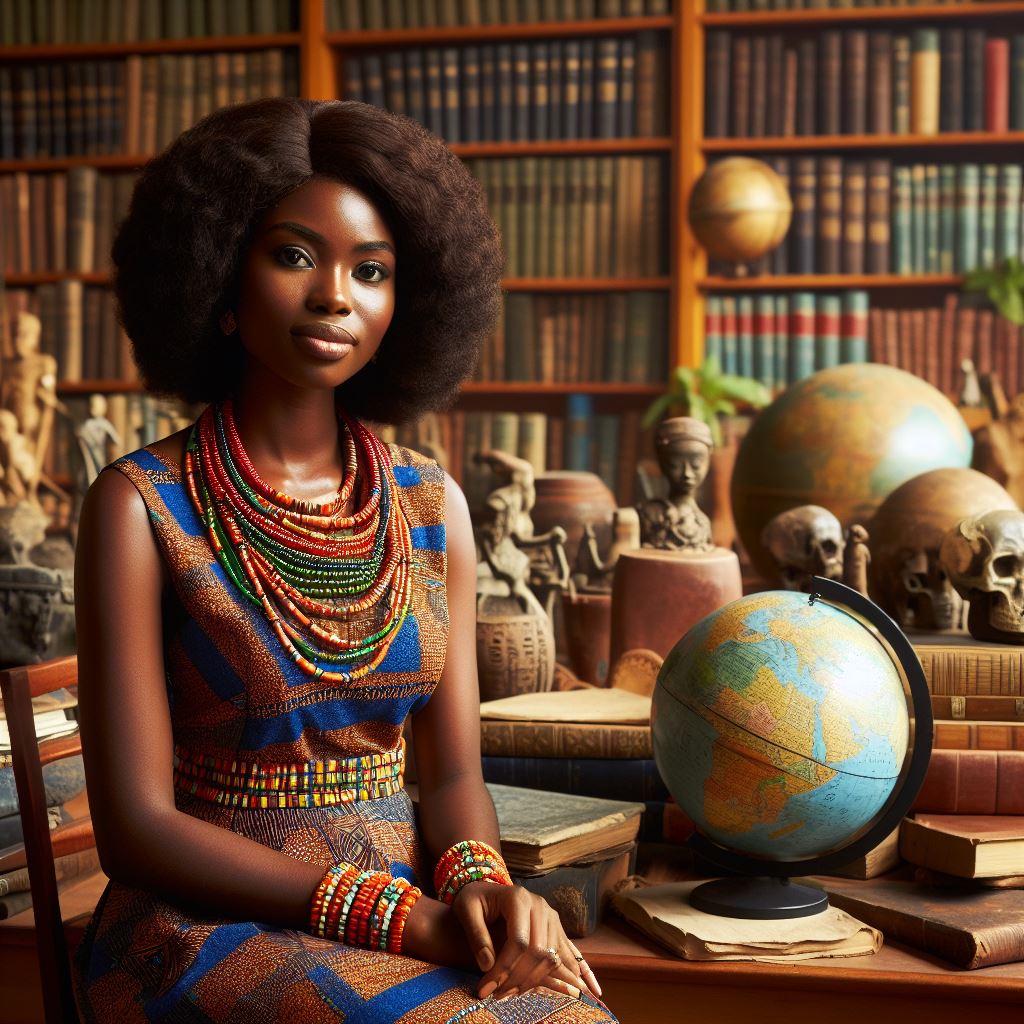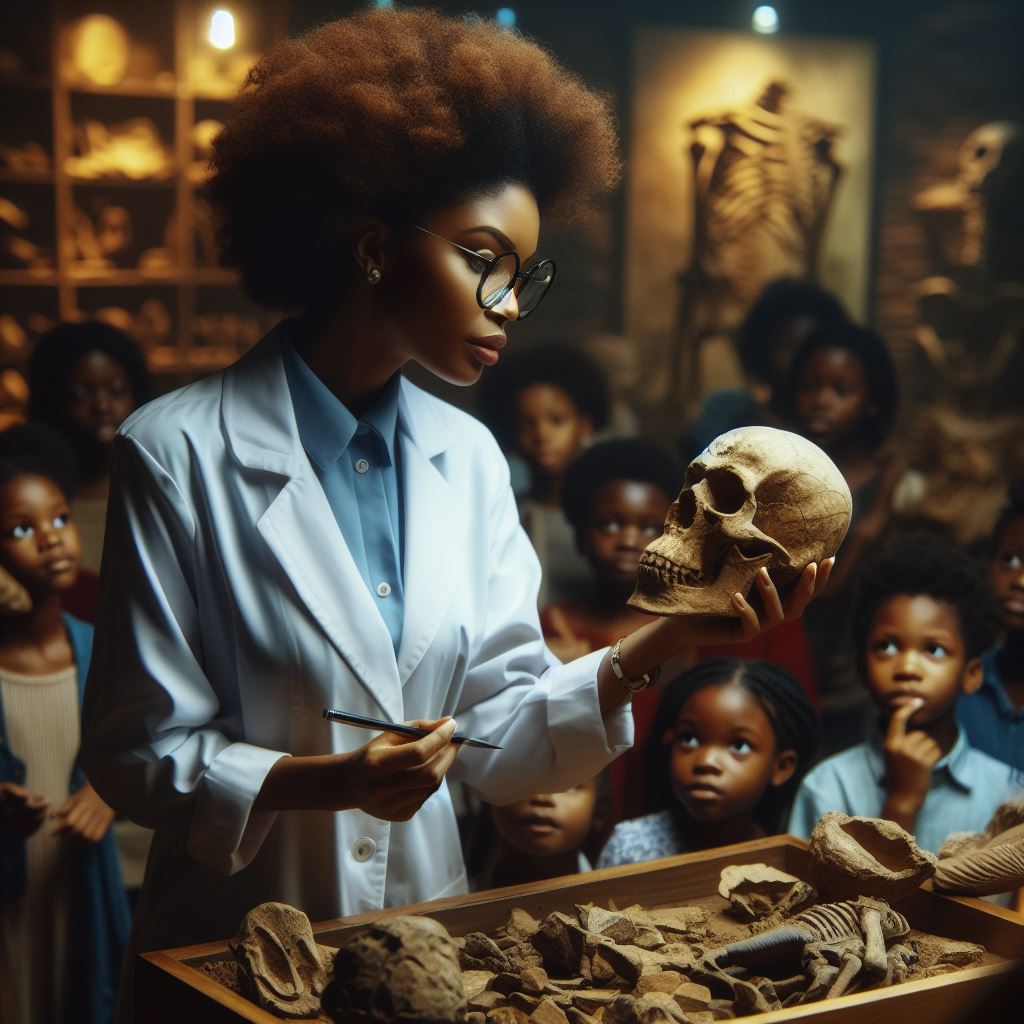Introduction
Brief Explanation of Anthropology
Anthropology is the scientific study of humans and their societies and how Anthropology Helps understand ethnic groups.
It explores cultural, social, and biological aspects of human beings. Anthropologists investigate human behavior, traditions, and social structures across different communities.
This field offers insights into the diversity and commonalities of human experiences.
Introduction to Nigerian Ethnic Groups
Nigeria is a nation of immense cultural diversity. It hosts over 250 ethnic groups, each with its unique identity. Major ethnic groups include the Yoruba, Igbo, and Hausa-Fulani.
These groups have distinct languages, traditions, and social norms. The richness of Nigeria’s ethnic tapestry is evident in its vibrant festivals, music, and art.
Importance of Understanding Nigerian Ethnic Groups through Anthropology
Anthropology provides valuable tools to understand Nigerian ethnic groups. It helps us appreciate the complexity and richness of their cultures.
By studying these groups, we learn about their histories, social structures, and worldviews. This understanding fosters mutual respect and reduces cultural misunderstandings.
Anthropological Insights into Nigerian Cultures
Historical Context
Anthropology uncovers the historical evolution of Nigerian ethnic groups. It reveals how historical events have shaped their identities and social structures.
This perspective helps explain contemporary cultural practices and societal norms. Understanding history is crucial to appreciating the present cultural landscape.
Social Structures and Organization
Anthropology examines the social organization of Nigerian ethnic groups. It explores kinship patterns, political systems, and economic activities.
These insights reveal how communities are structured and governed. For instance, the Yoruba have a well-defined hierarchical system, while the Igbo practice a more egalitarian form of governance.
Cultural Practices and Beliefs
Anthropologists study the cultural practices and belief systems of Nigerian ethnic groups. They document rituals, ceremonies, and religious practices.
This research highlights the spiritual and cultural significance of various traditions. Understanding these practices fosters respect and appreciation for cultural diversity.
Language and Communication
Language is a key aspect of cultural identity. Anthropology studies the languages spoken by Nigerian ethnic groups. It examines how language shapes communication and social interaction.
This knowledge helps preserve linguistic diversity and supports efforts to maintain indigenous languages.
The Role of Anthropology in Promoting Cultural Awareness
Educational Initiatives
Anthropology plays a vital role in education. It informs curriculum development and promotes cultural awareness.
By incorporating anthropological insights, educational programs can foster respect for Nigerian ethnic diversity.
This approach encourages students to appreciate and celebrate cultural differences.
Policy Development
Policymakers benefit from anthropological research. It provides data on the social needs and priorities of different ethnic groups.
This information supports the development of inclusive policies.
Such policies ensure that the diverse cultural backgrounds of Nigerian communities are considered.
Conflict Resolution
Anthropology aids in conflict resolution by promoting understanding and dialogue. It addresses cultural misunderstandings that often lead to conflicts. By fostering communication, anthropology helps build bridges between different ethnic groups.
This approach promotes peace and social cohesion.
In a nutshell, anthropology is crucial for understanding Nigerian ethnic groups. It offers deep insights into their histories, social structures, and cultural practices.
By appreciating this diversity, we can foster mutual respect and social harmony. Anthropology thus plays a vital role in promoting cultural awareness and inclusivity.
Definition of Anthropology
What is Anthropology?
Anthropology is the scientific study of humans, their behavior, and their societies. It explores the origins, development, and diversity of humans. Anthropologists seek to understand what it means to be human by examining both past and present human experiences.
This field draws on various disciplines, such as biology, history, and sociology.
Branches of Anthropology
Cultural Anthropology
Cultural anthropology studies human cultures and their development. It examines cultural beliefs, practices, and expressions across different societies.
Cultural anthropologists conduct fieldwork to gather data through participant observation, interviews, and surveys. They aim to understand how people live, think, and interact within their cultural contexts.
Physical Anthropology
Physical anthropology focuses on the biological aspects of humans. It investigates human evolution, genetics, and physical diversity. Physical anthropologists study fossils and skeletal remains to trace human ancestry.
They also examine how humans adapt to different environmental challenges and the biological basis of human behavior.
Linguistic Anthropology
Linguistic anthropology examines the role of language in human societies. It explores how language shapes communication, social identity, and cultural beliefs.
Linguistic anthropologists study language evolution, structure, and use. They analyze how language influences and reflects social life, contributing to our understanding of human cognition and culture.
Archaeology
Archaeology studies past human societies through their material remains. It involves excavating sites and analyzing artifacts, structures, and other physical evidence.
Archaeologists reconstruct past lifeways and understand historical changes. They help us learn about ancient cultures, technologies, and social organizations.
How Anthropology Studies Human Behavior, Culture, and Societies
Anthropology employs a holistic approach to study humans. It integrates various perspectives and methodologies to provide a comprehensive understanding.
Anthropologists use qualitative and quantitative methods to collect and analyze data. This multidisciplinary approach allows them to explore human behavior, culture, and societies in depth.
Fieldwork and Ethnography
Fieldwork is a crucial method in anthropology. Anthropologists immerse themselves in communities to observe and participate in daily life.
This method, known as ethnography, provides rich, detailed insights into cultural practices and social interactions. Ethnographers document their findings through notes, interviews, and recordings.
Comparative Analysis
Anthropologists compare different cultures and societies to identify universal patterns and unique variations. Comparative analysis helps them understand how cultural practices evolve and influence each other.
This approach reveals the diversity and commonalities of human experiences across the globe.
Interdisciplinary Collaboration
Anthropology often collaborates with other disciplines, such as biology, history, and psychology. This interdisciplinary approach enriches anthropological research and broadens its scope.
By integrating diverse perspectives, anthropologists can address complex questions about human nature and society.
Application of Theoretical Frameworks
Anthropologists apply various theoretical frameworks to interpret their findings. These frameworks guide their analysis and help them make sense of complex data.
Theories such as structuralism, functionalism, and postmodernism provide different lenses to examine human behavior and culture.
Contributions to Society
Anthropology contributes to our understanding of human diversity and fosters tolerance and empathy. It provides valuable insights into social issues, such as inequality, migration, and health.
By studying the past and present, anthropology helps us navigate contemporary challenges and build a better future.
Read: Comparing Communication Arts and Mass Communication
Importance of Studying Nigerian Ethnic Groups
Nigeria, Africa’s most populous country, boasts immense cultural diversity. Studying Nigerian ethnic groups reveals the rich tapestry of cultures, languages, traditions, and customs that define this nation.
Diversity of Nigerian Ethnic Groups
Nigeria is home to over 250 ethnic groups, each with distinct characteristics. The major ethnic groups include the Hausa-Fulani, Yoruba, and Igbo.
However, there are many smaller groups, such as the Tiv, Ibibio, and Kanuri. Each group contributes uniquely to Nigeria’s cultural mosaic. This diversity highlights the importance of understanding the various ethnic identities within Nigeria.
Differences in Culture
Each Nigerian ethnic group has its own unique culture. The Yoruba people, for instance, are known for their elaborate festivals and rich mythology.
The Hausa-Fulani are renowned for their Islamic traditions and vibrant trade networks. The Igbo, on the other hand, are famous for their entrepreneurial spirit and intricate traditional governance systems.
By studying these cultures, we gain insights into their historical development and social structures.
Language Variations
Nigeria’s linguistic diversity is astounding. There are over 500 languages spoken in the country. The Hausa language serves as a lingua franca in the north, while Yoruba and Igbo dominate the southwest and southeast respectively.
Smaller groups have their own languages, which are vital to their cultural identity. Preserving these languages is crucial for maintaining the heritage and identity of each group.
Traditional Customs
Traditional customs vary significantly among Nigerian ethnic groups. The Tiv people have unique agricultural festivals that celebrate the yam harvest. The Efik are known for their elaborate masquerade traditions.
The Nupe practice intricate beadwork and metalwork. Each group’s customs provide a window into their values, beliefs, and ways of life. Understanding these customs fosters appreciation and respect for Nigeria’s cultural richness.
Significance of Preserving Unique Identities
Preserving the unique identities of Nigerian ethnic groups is vital. These identities encompass language, traditions, customs, and history. They provide a sense of belonging and continuity for community members.
Moreover, they offer a wealth of knowledge and cultural heritage to the world. By studying and preserving these identities, we ensure that future generations can access and appreciate this cultural wealth.
Promoting National Unity
Understanding Nigeria’s ethnic diversity promotes national unity. When people appreciate the richness of different cultures, they are more likely to embrace and respect one another.
This fosters a sense of national identity that is inclusive and cohesive. It also helps mitigate conflicts arising from ethnic misunderstandings.
Enhancing Social and Economic Development
Studying ethnic groups can also enhance social and economic development. Knowledge of local customs and traditions can inform policies that are culturally sensitive and effective.
It can also boost tourism, as visitors are drawn to Nigeria’s cultural diversity. By leveraging the unique strengths of each ethnic group, Nigeria can achieve sustainable development.
In review, studying Nigerian ethnic groups is essential for understanding the country’s cultural diversity. It highlights the differences in culture, language, tradition, and customs.
Moreover, it underscores the significance of preserving each group’s unique identity. This knowledge fosters national unity and drives social and economic development. Thus, the study of Nigerian ethnic groups is not only important but indispensable.
Read: Language Arts Courses: What to Expect in Nigeria
Understanding Nigerian Ethnic Groups Through Anthropology
Anthropological Methods Used to Study Nigerian Ethnic Groups
Anthropology employs various methods to study Nigerian ethnic groups. These methods include participant observation, interviews, and surveys.
Participant observation immerses anthropologists in the daily lives of communities. They observe customs, rituals, and interactions firsthand. This method helps anthropologists gain a deep understanding of cultural practices.
Interviews are another essential method. Anthropologists conduct structured or semi-structured interviews with community members.
These interviews reveal personal stories, beliefs, and experiences. Surveys collect quantitative data on various aspects of community life.
This data includes demographic information, economic activities, and social structures. Combining these methods provides a comprehensive understanding of Nigerian ethnic groups.
Ethnographic Research and Fieldwork in Nigerian Communities
Ethnographic research and fieldwork are crucial in anthropological studies of Nigerian ethnic groups. It involves in-depth study of people and their cultures.
Anthropologists live within the community for extended periods. They engage in daily activities and build trust with community members. This approach allows them to document cultural practices accurately.
Fieldwork in Nigerian communities is often challenging but rewarding. Anthropologists must adapt to local conditions and overcome language barriers.
They work closely with local guides and translators. These collaborations ensure accurate and respectful representation of the community’s culture.
Fieldwork also involves recording oral histories and traditional knowledge. This documentation preserves cultural heritage for future generations.
Role of Anthropologists in Documenting and Preserving Cultural Heritage
Anthropologists play a vital role in documenting and preserving Nigerian cultural heritage. They record traditional songs, dances, and rituals.
This documentation includes detailed descriptions, photographs, and video recordings. Such records are invaluable for preserving cultural practices that may be at risk of disappearing.
Anthropologists also collaborate with local communities to promote cultural preservation. They help establish cultural centers and museums.
These institutions display artifacts and educate the public about local traditions. Anthropologists advocate for the protection of sacred sites and cultural landscapes. Their work ensures that cultural heritage is respected and maintained.
Transform Your Career with Expert Guidance
Get personalized mentorship consulting that’s tailored to your unique path. Our expert advice is actionable and exclusive.
Get StartedAnthropologists often work with local educators. They develop curricula that include indigenous knowledge and cultural practices. This educational approach fosters pride and awareness among younger generations.
It helps integrate traditional knowledge into formal education systems. This collaboration strengthens the cultural identity of Nigerian ethnic groups.
Anthropologists contribute to policy-making and development projects. They ensure that these initiatives respect and incorporate local cultures.
Their insights prevent the erasure of cultural practices and promote sustainable development. By documenting and preserving cultural heritage, anthropologists support the resilience of Nigerian ethnic groups.
In colclusion, anthropology provides essential tools to understand Nigerian ethnic groups. Methods like participant observation and interviews reveal the depth of cultural practices.
Ethnographic research and fieldwork offer detailed insights into community life. Anthropologists document and preserve cultural heritage, ensuring its continuity.
Their work fosters respect and appreciation for Nigeria’s diverse cultures. Through anthropology, we gain a deeper understanding of Nigerian ethnic groups and their rich cultural heritage.
Read: Internship Opportunities for Communication Arts Students

Cultural Traditions and Practices
Anthropology plays a crucial role in understanding Nigerian ethnic groups by delving into their cultural traditions and practices. This field of study helps shed light on the unique customs and beliefs that define various ethnicities in Nigeria.
Exploration of Unique Cultural Practices
One of the key aspects that anthropology focuses on is exploring the diverse and distinctive cultural practices of different Nigerian ethnic groups.
From the Igbo to the Yoruba and the Hausa, each group has its own set of customs that have been passed down through generations.
These cultural practices encompass various aspects of life such as marriage ceremonies, coming-of-age rituals, and even everyday routines.
By studying these practices, anthropologists gain valuable insights into the social structures and belief systems of these ethnic groups.
Traditional Ceremonies, Rituals, and Festivals
Anthropologists also examine the traditional ceremonies, rituals, and festivals that are an integral part of Nigerian cultural heritage.
These events play a significant role in preserving the cultural identity of ethnic groups and are often considered sacred and essential for community cohesion.
From the Durbar festival in the north to the Osun-Osogbo festival in the south, these ceremonies showcase the rich cultural tapestry of Nigeria.
Anthropologists document these traditions to understand their significance and the role they play in shaping the identity of different ethnic groups.
Impact of Modernization and Globalization on Cultural Traditions:
In recent years, Nigeria has undergone rapid modernization and globalization, which has had a profound impact on traditional cultural practices.
Anthropologists study how these external forces influence the way ethnic groups engage with their culture and heritage.
Globalization has led to the adoption of foreign practices and the erosion of traditional customs in some communities.
Modernization, on the other hand, has brought about changes in social structures and values, challenging the age-old traditions of Nigerian ethnic groups.
By examining the effects of modernization and globalization on cultural traditions, anthropologists can offer valuable insights into how these changes are reshaping the cultural landscape of Nigeria.
This understanding is crucial for preserving the unique heritage of Nigerian ethnic groups and ensuring that their traditions are passed down to future generations.
Read: Impact of Communication Arts on Nigerian Media
Language and Communication
Diversity of Languages Spoken in Nigeria
Nigeria’s linguistic diversity is staggering. Over 500 languages are spoken across its regions. The three most prominent languages are Hausa, Yoruba, and Igbo.
These languages dominate the north, southwest, and southeast respectively. Each of these major languages has several dialects, reflecting the complex cultural tapestry of Nigeria.
Study of Language Dialects and Variations
Anthropologists study these dialects to understand cultural differences and similarities. They examine how dialects vary within the same language.
For example, the Yoruba language has distinct dialects like Egba, Ijebu, and Ekiti. These variations reveal historical migrations, interactions, and influences among ethnic groups. By studying dialects, anthropologists uncover how languages evolve over time.
Importance of Language in Preserving Cultural Identity
Language is a vital part of cultural identity. It carries traditions, beliefs, and customs through generations. For many Nigerians, speaking their native language reinforces their connection to their heritage.
Language is not just a communication tool; it is a repository of collective memory. It preserves stories, proverbs, and oral histories that define a community’s ethos.
Linguistic Anthropology in Nigeria
Linguistic anthropology plays a crucial role in preserving Nigeria’s linguistic heritage. Researchers document and analyze endangered languages to prevent their extinction.
They work with communities to promote the use of native languages in schools and media. This effort helps maintain cultural diversity and fosters pride among younger generations.
Language and Social Structure
Language reflects and reinforces social structures. In Nigeria, different languages can indicate social status, profession, or ethnic background.
Multilingualism is common, with many Nigerians speaking several languages fluently. This skill enhances communication across diverse ethnic groups. It also facilitates trade, politics, and social integration.
Language and Religion
Religion significantly influences language use in Nigeria. Arabic is widely used in Islamic practices in the north. Christianity in the south has introduced English and Portuguese loanwords into local languages.
Religious texts and practices often incorporate native languages, blending spiritual and cultural elements uniquely.
Challenges in Language Preservation
Globalization poses a threat to Nigeria’s linguistic diversity. English, as the official language, dominates education, business, and government.
This dominance can marginalize indigenous languages, leading to their decline. Efforts to revive and promote local languages face numerous challenges. These include limited resources, lack of institutional support, and changing societal values.
In general, anthropology sheds light on the intricate tapestry of Nigeria’s languages. It highlights the importance of preserving linguistic diversity for cultural heritage.
Through the study of language and communication, we gain deeper insights into Nigeria’s rich cultural landscape. Efforts to preserve and promote indigenous languages are vital for maintaining the nation’s unique identity.
Language is not just a medium of communication; it is the heartbeat of cultural existence.
Social Structures and Relationships
Analysis of Kinship Systems and Social Hierarchies
Anthropology provides deep insights into Nigerian kinship systems. Kinship defines social connections in Nigerian ethnic groups. It shapes identity, inheritance, and social responsibilities.
Nigerian societies often emphasize extended families over nuclear families. This emphasis fosters strong communal bonds and mutual support. Kinship systems vary across Nigeria’s diverse ethnic landscape.
Among the Yoruba, patrilineal descent dictates lineage and inheritance. Conversely, the Igbo practice both patrilineal and matrilineal descent, reflecting flexibility in social structures.
Kinship ties extend beyond immediate family, creating expansive networks of relatives. These networks ensure support during crises, celebrations, and daily life.
Hierarchies also play a critical role in Nigerian societies. Social status often derives from age, gender, and family lineage. Elders hold significant authority and respect in many communities.
For instance, the Hausa-Fulani value elders’ wisdom in decision-making processes. Titles and chieftaincy systems reinforce social hierarchies within ethnic groups.
Among the Igbo, the title of “Ozo” confers high status and influence. Such hierarchies ensure order and continuity within communities.
Interactions Between Different Ethnic Groups
Interactions between Nigeria’s ethnic groups are complex and multifaceted. Trade, marriage, and migration facilitate these interactions.
Historically, trade routes connected different regions, fostering economic and cultural exchange. The Niger River served as a crucial trade artery, linking diverse ethnicities.
Intermarriage between ethnic groups also promotes social cohesion. These unions blend traditions, creating hybrid cultures and fostering unity.
Migration within Nigeria further enhances ethnic interactions. People move for work, education, or better living conditions, blending cultures and traditions.
Despite these positive interactions, tensions sometimes arise. Competition for resources and political power can fuel conflicts.
However, traditional conflict resolution mechanisms often mediate disputes. Elders and community leaders play vital roles in these processes.
For example, the Yoruba “Aroko” system uses symbolic communication to resolve conflicts. Such mechanisms help maintain peace and foster cooperation.
Understanding Power Dynamics and Social Norms Within Nigerian Communities
Power dynamics in Nigerian communities are deeply rooted in tradition and culture. Leadership often combines formal and informal authority.
Formal leadership includes political positions and recognized titles. Informal leadership relies on age, wisdom, and social influence. In many ethnic groups, councils of elders wield significant power.
These councils guide decision-making and conflict resolution. Among the Tiv, the “Tyoor” serves as a key leader, representing the community in broader political spheres.
Gender roles significantly impact power dynamics. In many Nigerian societies, men typically hold more public authority. However, women play crucial roles within families and communities.
The Igbo “Umuada” group, composed of women, wields substantial influence in family matters. Social norms dictate acceptable behaviors and interactions within communities.
Respect for elders and communal support are common values. Rituals and ceremonies reinforce these norms, fostering a sense of identity and continuity.
Anthropology’s insights into these social structures illuminate the complexities of Nigerian ethnic groups. Understanding kinship, hierarchies, interactions, and power dynamics is crucial.
It reveals how these elements shape Nigerian society, promoting unity and managing conflicts. Through this lens, we appreciate Nigeria’s rich cultural tapestry and the resilience of its communities.
Conclusion
Recap of the Importance of Anthropology in Understanding Nigerian Ethnic Groups
Anthropology plays a crucial role in understanding Nigerian ethnic groups. It provides insights into their cultures, traditions, and social structures.
Anthropologists study these groups’ languages, customs, and belief systems. This helps to uncover the diverse ways of life among Nigeria’s many ethnic communities.
By examining historical contexts, anthropology reveals how past events shape contemporary practices. This field also helps to identify commonalities and differences among Nigerian ethnic groups.
Understanding these aspects fosters mutual respect and reduces ethnic tensions. Anthropology thus serves as a vital tool for promoting national unity in Nigeria.
Encouragement for Further Research and Exploration of Nigerian Cultural Diversity
Further research in anthropology is essential for exploring Nigeria’s rich cultural diversity. There is still much to learn about the smaller and less studied ethnic groups.
Researchers should delve into the unique traditions and practices of these communities. Each ethnic group in Nigeria contributes to the nation’s cultural mosaic.
Documenting these contributions enhances our appreciation of Nigeria’s cultural wealth. Universities and research institutions should prioritize funding for anthropological studies.
Collaborations between Nigerian and international scholars can yield valuable insights. By encouraging such research, we can better preserve and celebrate Nigeria’s diverse heritage.
Call to Action for Promoting Cultural Awareness and Appreciation for Nigerian Ethnic Groups
Promoting cultural awareness is crucial for appreciating Nigerian ethnic groups. Educational programs should incorporate comprehensive lessons on Nigeria’s ethnic diversity.
Schools can organize cultural exchange programs to foster understanding among students. Media outlets should highlight stories that celebrate Nigeria’s various cultures.
Communities should organize festivals that showcase traditional music, dance, and cuisine. Social media platforms can serve as powerful tools for spreading cultural knowledge.
Individuals should take the initiative to learn about the ethnic groups around them. By promoting cultural awareness, we can build a more inclusive and harmonious society.
In essence, anthropology helps us understand the rich tapestry of Nigerian ethnic groups. It reveals the intricate details of their lives, traditions, and histories.
Further research can uncover even more about Nigeria’s cultural diversity. We must actively promote cultural awareness and appreciation. Doing so will foster unity and respect among Nigeria’s many ethnic communities.




